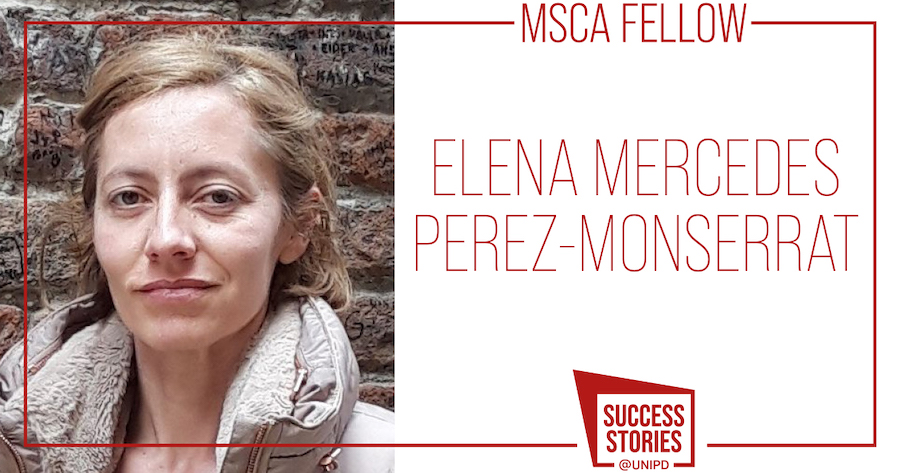
MSCA Fellow: Elena Mercedes Perez Monserrat
If only walls could talk … what would their bricks tell you? We have asked Elena, to know more about the story behind the building materials that shape ancient urban constructions around us!

Elena has a Master Degree in Conservation and Restoration of Architectural and Urban Heritage and a PhD in Geology. She has been working at the Institute of Geosciences of Madrid on the characterization, provenance and decay of building materials that shape the built heritage around us. She won a MSCA Individual Fellowship in 2018 and is now working at the Unipd Geoscience Department.
In the view of enhancing the cultural value of ancient structures and mitigating the negative impact that climate changes may have on them, her MSC project addresses the resistance of the bricks that shape the built heritage of Padua. Elena uses European heritage as a knowledge resource: find out how studying the provenance of clay and its manufacturing processes over time can lead to sustainable raw material supply and brick production!
Elena, can you tell us something about you and why you chose to apply for a MC-IF?
Hello everyone, I am a Spanish geologist, I have done my Ph.D. in Geology at the Complutense University of Madrid (Spain) and I carried out a Master Degree in Conservation and Restoration of Architectural and Urban Heritage at the Polytechnic University of Madrid (Spain). I have been working at the Institute of Geosciences of Madrid on the characterization, provenance and decay of building materials that shape the built heritage. My career entails a commitment to the dissemination of the scientific knowledge on building materials for a better preservation of the ancient constructions. I decided to focus my research activity on the production technologies of ancient bricks and to apply for a MC-IF framed on this topic, as such fellowship provides a broad range of professional opportunities and a great experience.
Why did you choose the University of Padua as your host institution?
On the one side, the prestige of the University and its wide experience in European project management. Besides, the numerous multi-analytical and interdisciplinary studies on archaeological ceramics conducted by the project supervisor, Prof. Lara Maritan - frequently through collaborations with the Cultural Heritage Department - as well as the available facilities at the Geosciences Department. Moreover, Padua is located in the Pianura Padana, which is characterized by the abundance of clay materials, the built heritage of the city is largely shaped by building bricks and the region has an important ceramic industry. On the other side, as a Spanish citizen, the city of Padua seemed a quite suitable setting for a post-doctoral experience. In fact, almost since the first day, living here has certainly been very kind and welcoming to me.
Your research project pays attention both to social and environmental issues. Is this an important aspect for a MC-IF proposal?
Yes, the CLAYONRISK project addresses the resistance over time of the bricks that shape the built heritage of Padua from the manufacturing process, in order to highlight the cultural values of the city and to mitigate the negative impact of climate changes on ancient structures. It should be considered that clayey materials have played an essential role in the development of humankind, as wealth driver with direct impact on its economic, environmental and socio-cultural well-being.
Interdisciplinary studies of bricks shaping the built heritage entails a knowledge base loaded with heritage and technological value. Therefore, when a given area is considered, the knowledge achieved represents a heritage resource that confers special cohesion and identity to such a territory. Moreover, information about production processes, raw materials provenance or skills developed, provides significant technological data that could be applied to current ceramic industry challenges, such as sustainable raw materials supply and brick production or environment protection by means of green-solutions.
Social and environmental issues are very important aspects to be included in a MC-IF proposal. Topics such as sustainable development, environmental sustainability, social cohesion or inclusive growth were highly emphasized by the H2020 agenda. Furthermore, H2020 encourages the development of multidisciplinary projects that ensure a sustainable supply of raw materials and address eco-innovation activities. In the same way, my project somehow promotes the use of European heritage as a knowledge resource that reinforces inclusiveness and the emergence of a European common identity.
Your work seems an interdisciplinary one, with both scientific and humanistic features. Is this an added value for the MCSA evaluating committee?
Yes, it is. In my professional career, I have been searching for multidisciplinary approaches where documentary sources, on-site observations and data provided by the analytical techniques were addressed together. I try to point out the heritage value presented by the traditional materials that shape the image of the built heritage, as its intrinsic features are due precisely to the use of very specific materials. In Padua, certainly, the history of the city is collected in its built heritage and the building bricks play an exceptional role.
I think that the MCSA evaluating committee has taken into account that my proposal considered the traditional bricks as a resource of increasing knowledge in order to achieve improvements on the current sustainable brick production technologies. Besides, the proposal also underlined how ancient bricks provide social cohesion to territories, as such materials are entangled with their people and their cultural identity. Moreover, the committee may have also considered the interconnection between environmental and social challenges, as well as cultural heritage policies, with the scientific co-operation launched by the proposal.
International Research Office
via Martiri della libertà 8, 35137 Padova, Italy
tel. +39 049.827 1947 / 1948 / 1945
fax +39 049.827 1911
international.research@unipd.it


